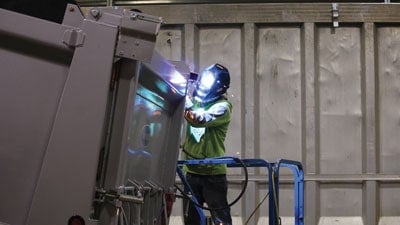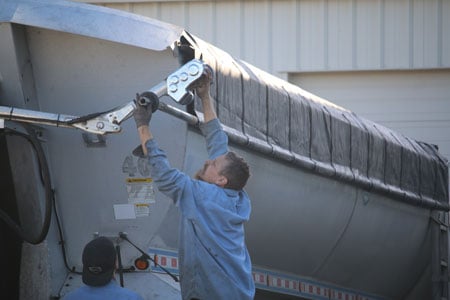As an alternative to do-it-yourself tarp installation, haulers minimize risks, cut costs and increase uptime
By Chris Nicolazzo
When a truck is down on the side of the road due to a malfunctioning tarp, haulers are faced with the risky decision: to fix it on their own or to use a tarpologist (professional tarping expert). When haulers try to fix it themselves, it quite often results in health and safety issues, possible fines and liability, potential damage to the equipment due to improper installation and significantly greater downtime due to inefficiency and lack of specialized equipment and unavailability of needed parts. However, an increasing number of haulers are choosing to work with tarpologists, to handle their tarping selection and installation needs. By troubleshooting issues, providing quotes in minutes, bringing parts and service directly to the user, and sending trucks back on the road in no time, tarpologists minimize safety risks, cut costs and increase uptime for haulers across the nation.
What is a Tarpologist?
A tarpologist is an expert tarping specialist that is trained to match a trucker’s equipment with the best tarping system for their application with the convenience of on the road or in the field installation. A tarpologist’s primary job is to keep fleets on the road. With this goal in mind, they travel to where the work needs to be performed, fully equipped with every needed part. By eliminating the end user from doing the installation, a tarpologist minimizes the risk with a convenient, safe and reliable solution.
Minimize Safety Risks
Tarp installations and repairs can be complex and complicated. Without a tarpologist, truckers can be found onsite trying to read instructions, sometimes sliding off the truck and hurting themselves—and, nearly always, wasting lots of time. Tarpologists come directly to the location of the truck and take the risk out of the equation.
Often, those who may be asked to repair or replace a tarp do not have the proper training to complete the task. In certain states, OSHA requires an appropriate fall-protection system, equipment and training to complete these tasks, and non-compliance can create huge areas of potential liability for the company and lead to hefty fines. Most importantly, untrained workers are more apt to injure themselves.
Jamie Veach, sales representative for Ohio-based Glockner Truck and Trailer Sales, shares how he made the decision of using a tarpologist and how it now provides his company with a competitive advantage: “Before we started using a tarpologist, it was a fiasco because our guys in the shop didn’t know how the tarp worked and what was going on with the system. We learned that if you aren’t careful, you can hurt yourself. If you take the tarp apart at the wrong point, the arm will come back and strike you. We actually had that happen when our workers were moving the tarping system and it trapped his finger between the side of the trailer and the tarp, and it almost cut his finger off. It was pretty dangerous. We ended up having to call a tarpologist to straighten it out and get it going. It was a lot more economical to get a tarpologist to do it instead of my shop guy because they knew what they were doing and got it right the first time.”
Further, having employees install or repair tarps can open additional areas of liability, including neck and back injuries resulting from lifting heavy material or slip and fall injuries resulting from sliding off a truck or ladder or stumbling in gaps in the load. These scenarios can also cost truck companies thousands of dollars in liability and workers’ compensation costs.
General workers and truckers typically do not have access to the specialized equipment needed to safely and easily repair or replace a tarp. Proper welding equipment and protection is essential. While workers typically use safety glasses and look away, tarpologists wear welding protective helmets with a square piece that shields the flash to eliminate the risk of eye damage.

Cut Costs
Selecting a tarpologist for field and on-the-road installations and repair is better for a trucker’s business and bottom line. Shayne McCallie, the President of Atomic Transport based in Alabama, discusses how tarpologists help save his company time and money while satisfying customers on a daily basis: “We know that the tarpologists will provide support and make sure we meet the timelines required by our customers to have our equipment in service. In areas where we have limited resources, we prefer to have a tarpologist come to us. When you consider how costly it would be for us to pay for fuel and associated costs to transport ourselves to another location and to wait on new equipment that wasn’t ready to go to work on time, having a tarpologist to bring the tarps to the location and do the installation onsite is definitely the most cost-effective option.”
With a tarpologist, you can eliminate the possible costs of wasted time and resources along with liability costs and potential damage to the equipment due to improper installation when trying to repair a tarp on your own. By bringing parts and service directly to the user, tarpologists save haulers money for maintenance solutions for the long haul.
Increase Uptime
Tarps take a lot of abuse, in all sorts of extreme environments, and timely installations reduce downtime and boost productivity. When a trucker is on the road and does not have time to stop at a repair shop for their tarping system, a tarpologist can save them time by coming right to their location, replacing it instantly while reducing fuel costs associated. Adjusting, removing or applying a tarp can be a daunting and time-consuming task for an inexperienced worker.
Ladders are also needed for tarp self-service. With a standard ladder, workers have to move multiple times to adjust the ladder and to get back up and down numerous times to install the tarp. However, tarpologists use special scissor lifts with controls to move the lift automatically without having to get back up or down, which speeds up the repair process and sends trucks back on the road in no time.

If a user’s truck is not tarp compliant, it could result in loss of business if other trucks are ready to hit the road. A tarpologist can immediately and reliably accomplish the job, getting trucks back on the road much more quickly. Trucking company mechanics are often stretched thin.
Using a tarpologist allows them to focus on more mission-critical repairs, positively impacting uptime for the entire fleet rather than one truck.
Get Started
Every day, haulers make the risky decision to install or repair a tarping system on their own, which quite often results in a less than ideal outcome. When choosing between installing or repairing a tarping system on your own versus the alternative of using a tarpologist, the decision should be simple. Tarpologists (or tarping experts) provide haulers with a convenient and reliable experience that saves time and money. By minimizing safety risks, cutting costs, and increasing uptime, tarpologists are game changers for tarp maintenance solutions.
Chris Nicolazzo is the Vice President/General Manager for Mountain Tarp/Pioneer, a division of Wastequip (Charlotte, NC). With more than 12 years of experience in the waste industry, Chris specializes in connecting customers with tarping systems to meet their safety needs. He can be reached at [email protected].
Since 1987, Mountain Tarp has been manufacturing reliable tarping systems for construction, agriculture, transportation and waste applications. Mountain Tarp has an established dealer network across the U.S. and operates repair, installation and parts facilities in Ohio, Kentucky, Texas and Massachusetts. To find a tarpologist in your area, it is best to contact the local manufacturer’s regional sales manager for pricing and options for on the road and in the field installation and repairs. For more information, visit www.mountaintarp.com or https://try.mountaintarp.com/choosing-a-tarpologist.
